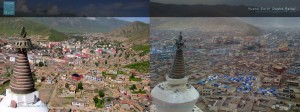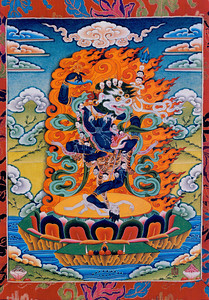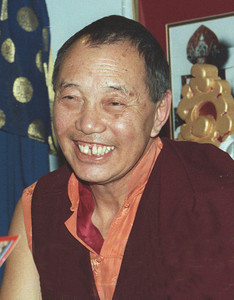 Before and After Image of Jyekundo City
Before and After Image of Jyekundo City
Article compiled by Thubten Palzang:
The severe earthquake that struck Yushu County in Northeast Kham (now China) on April 14, 2010, destroyed or severely damaged towns and monasteries in the area. Jyekundo Dondrubling Monastery, located in Jyekundo City near the epicenter, was severely damaged. At the time of the earthquake, 44 monks at the monastery who were in the midst of sojong (ordained confession practice) inside the monastery were killed. Monks at nearby Chekyeku Monastery, which is larger than Jyekundo, were also in the midst of sojong when the earthquake hit, but they were practicing on the veranda and were able to escape injury except for two young monks, not old enough to take full vows, who were inside the temple and were killed. In the city of Jyekundo itself, which has about 80,000 inhabitants, as of April 17 there were 1,484 reported dead, 417 missing, 1,394 severely injured, another 12,088 injured, and 80% of the residents are homeless. A school there collapsed during the earthquake killing all 115 students and teachers inside. The county hospital in Jyekundo was also destroyed.
The birthplace and monastery of Ayang Rinpoche, of the Amitabha Foundation and a good friend of His Holiness Penor Rinpoche (His Holiness performed the Kalachakra in Rochester for the Amitabha Foundation in 1970) is also located in Rima, the actual epicenter of the quake. A new clinic and boarding school sponsored by the Amitabha Foundation are also located in Rima. There are no reports yet on damage and casualties in Rima.
Yushu is located in the Northwest corner of Sichuan Province, several hundred miles northeast of the main Palyul monastery. The nearest Palyul branch monastery is Tarthang Monastery, home to Tarthang Tulku, about 211 miles to the west of Jyekundo. No reports of damage or injuries have been heard from there as yet.
The remoteness of the affected area has impeded aid reaching the victims. The airport as Jyekundo has reopened, allowing aid to be flown in. Much of what aid is available is coming from monastery stores in the area, particularly food and medical assistance.
As of today (April 21), the number of known dead is approaching 2,000. The International Campaign for Tibet is supporting earthquake relief efforts. Contributions can be made at https://salsa.wiredforchange.com/o/6063/shop/custom.jsp?donate_page_KEY=3457





